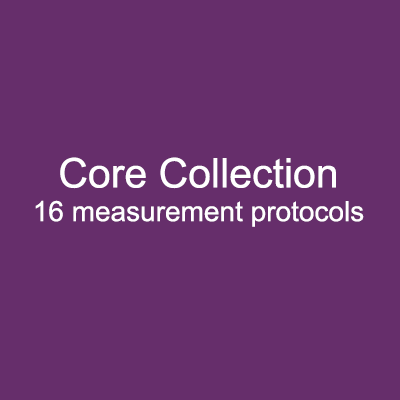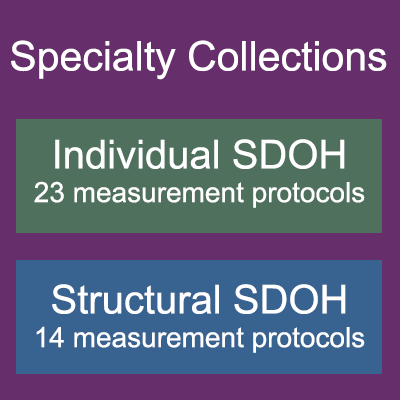PhenX Social Determinants of Health (SDOH) Assessments Collection
The PhenX Social Determinants of Health (SDOH) Collection, available in the PhenX Toolkit, expands data protocols to help measure individual as well as structural factors that shape behaviors and health outcomes.


The PhenX SDOH Toolkit provides standard data collection protocols that make it easier for investigators to select measures for use in their own research and to help with comparing, sharing, and combining data from different studies.
Widespread adoption of the collection can lead to greater understanding of social factors that affect health by facilitating the design and evaluation of interventions to improve minority health and reduce health disparities.
About the Collection
The SDOH Collection is arranged as a core collection, and two specialty collections, individual and structural.
Core Collection 16 protocols
- Race and Ethnicity
- Age
- Annual Family Income
- English Proficiency
- Occupational Prestige
- Access to Health Services
Specialty Collections
These two specialty collections are complementary to the Core Collection and allow more nuanced investigations of how SDOH influence health.
Individual SDOH
23 protocols
Information collected from and about people answering for themselves at the individual level of the NIMHD Research Framework about their physical/built, and sociocultural environment or healthcare system.
The Individual SDOH Collection includes elements such as:
- Affordability of accessing dental care or prescriptions
- Family history of incarceration
- Health care communications
- Housing instability due to affordability
- Internet access
- Religious behaviors and congregational support
Structural SDOH
14 protocols
Protocols at the societal or community level of the NIMHD Research Framework. measuring the physical/built environment or sociocultural environment of a specific geographic area such as state, county, or a census-defined unit, such as census tract or ZIP Code.
Examples of protocol elements in the Structural SDOH Collection include:
- Minimum wage
- Neighborhood walking and biking environment
- Residential concentrations of income
- Water access and sanitation
- Race/ethnic residential segregation
Protocol Collection Features
Researchers are encouraged to use the PhenX SDOH protocols for all primary data collection. The new collection of standard measures of SDOH in behavioral, clinical, and translational research facilitates:
- Harmonizing of information from different studies over time, expanding research and collaboration among researchers.
- Ability to validate study findings by replicating data and aiding in comparisons.
- Capability to combine study samples, which can provide greater statistical power.
- Ability to conduct cross-study analysis to increase the impact of individual studies.
About the PhenX Toolkit
The PhenX Toolkit (consensus measures for Phenotypes and eXposures) provides recommended standard data collection protocols for conducting biomedical research.
The Toolkit provides detailed protocols for collecting data and tools to help investigators incorporate these protocols into their studies. Using protocols from the PhenX Toolkit facilitates cross-study analysis, potentially increasing the scientific impact of individual studies.
The protocols are selected by working groups of domain experts using a consensus process, which includes the scientific community.
In 2020 and 2021, NIMHD funded administrative supplements to establish two workgroups to expand the selection of high-quality SDOH standard measures. Each working group included scientists with relevant expertise from the community and was led by a team of NIMHD scientists.
NIMHD PhenX SDOH Working Group
- Dr. Nancy Jones, Co-chair
- Dr. Vanessa Marshall, Co-chair
- Dr. Monica Webb Hooper
- Dr. Rada Dagher
- Dr. Gabriel Lai
Page updated Dec. 6, 2023

















